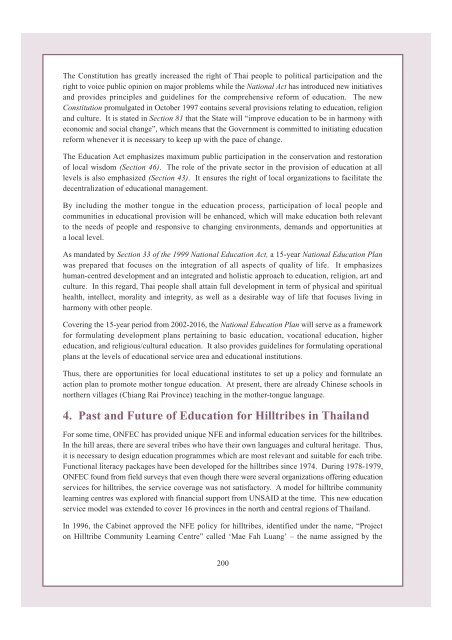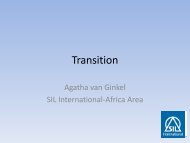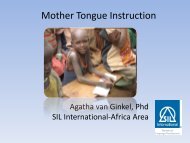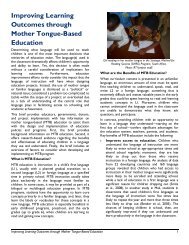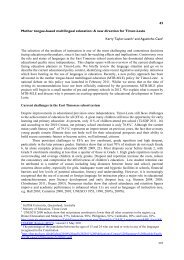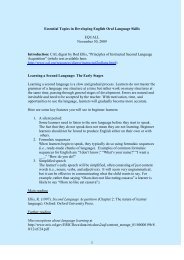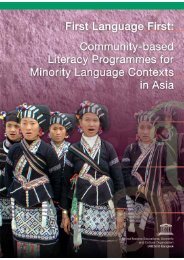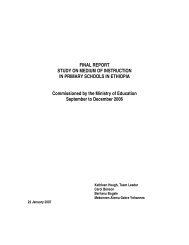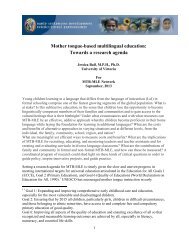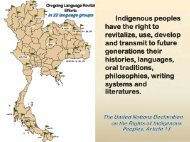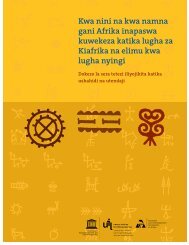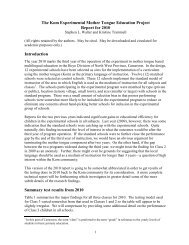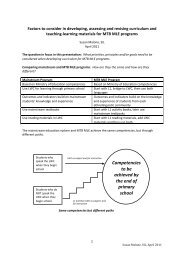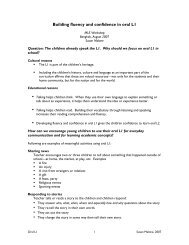Part II.pdf - MTB-MLE Network
Part II.pdf - MTB-MLE Network
Part II.pdf - MTB-MLE Network
Create successful ePaper yourself
Turn your PDF publications into a flip-book with our unique Google optimized e-Paper software.
The Constitution has greatly increased the right of Thai people to political participation and the<br />
right to voice public opinion on major problems while the National Act has introduced new initiatives<br />
and provides principles and guidelines for the comprehensive reform of education. The new<br />
Constitution promulgated in October 1997 contains several provisions relating to education, religion<br />
and culture. It is stated in Section 81 that the State will “improve education to be in harmony with<br />
economic and social change”, which means that the Government is committed to initiating education<br />
reform whenever it is necessary to keep up with the pace of change.<br />
The Education Act emphasizes maximum public participation in the conservation and restoration<br />
of local wisdom (Section 46). The role of the private sector in the provision of education at all<br />
levels is also emphasized (Section 43). It ensures the right of local organizations to facilitate the<br />
decentralization of educational management.<br />
By including the mother tongue in the education process, participation of local people and<br />
communities in educational provision will be enhanced, which will make education both relevant<br />
to the needs of people and responsive to changing environments, demands and opportunities at<br />
a local level.<br />
As mandated by Section 33 of the 1999 National Education Act, a 15-year National Education Plan<br />
was prepared that focuses on the integration of all aspects of quality of life. It emphasizes<br />
human-centred development and an integrated and holistic approach to education, religion, art and<br />
culture. In this regard, Thai people shall attain full development in term of physical and spiritual<br />
health, intellect, morality and integrity, as well as a desirable way of life that focuses living in<br />
harmony with other people.<br />
Covering the 15-year period from 2002-2016, the National Education Plan will serve as a framework<br />
for formulating development plans pertaining to basic education, vocational education, higher<br />
education, and religious/cultural education. It also provides guidelines for formulating operational<br />
plans at the levels of educational service area and educational institutions.<br />
Thus, there are opportunities for local educational institutes to set up a policy and formulate an<br />
action plan to promote mother tongue education. At present, there are already Chinese schools in<br />
northern villages (Chiang Rai Province) teaching in the mother-tongue language.<br />
4. Past and Future of Education for Hilltribes in Thailand<br />
For some time, ONFEC has provided unique NFE and informal education services for the hilltribes.<br />
In the hill areas, there are several tribes who have their own languages and cultural heritage. Thus,<br />
it is necessary to design education programmes which are most relevant and suitable for each tribe.<br />
Functional literacy packages have been developed for the hilltribes since 1974. During 1978-1979,<br />
ONFEC found from field surveys that even though there were several organizations offering education<br />
services for hilltribes, the service coverage was not satisfactory. A model for hilltribe community<br />
learning centres was explored with financial support from UNSAID at the time. This new education<br />
service model was extended to cover 16 provinces in the north and central regions of Thailand.<br />
In 1996, the Cabinet approved the NFE policy for hilltribes, identified under the name, “Project<br />
on Hilltribe Community Learning Centre” called ‘Mae Fah Luang’ – the name assigned by the<br />
200


